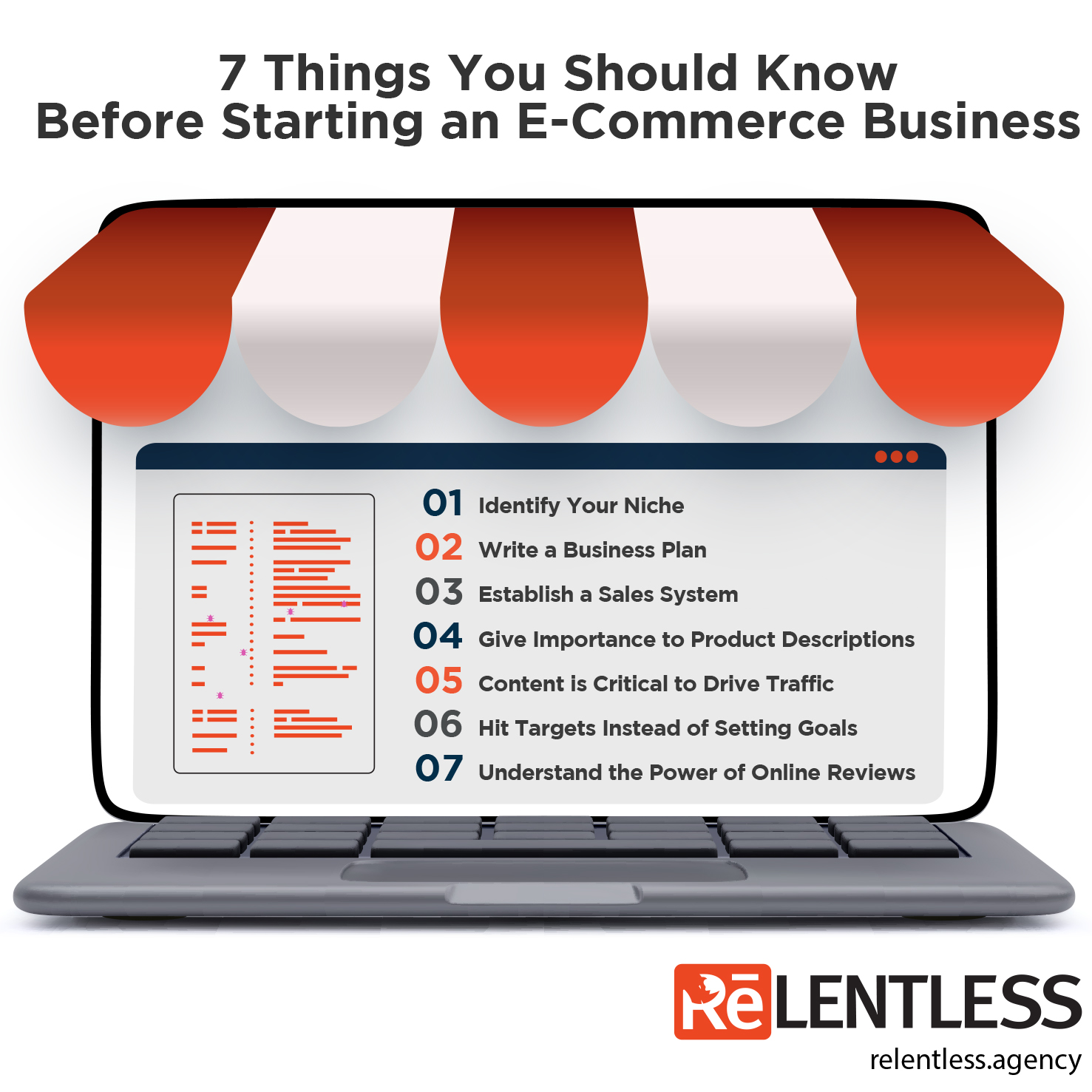Over the past few years, E-Commerce has become increasingly popular. It is now considered an essential part of the global retail framework. Like many other industries, the retail landscape has undergone a substantial transformation thanks to the internet. Because of the widespread adoption of digitalization, consumers from every part of the world can now benefit from online transactions. In 2020, over two billion people purchased goods or services online. It resulted in record-breaking sales of 4.2 trillion dollars worldwide from E-Commerce alone.

Given this fact, many people have been thinking of establishing their businesses through E-Commerce. However, due to the excitement, some have made rash decisions and jumped in with little research on what to expect. This article should help you understand the top seven things you should know before starting an E-Commerce Business.

Identify Your Niche
By definition, a niche is a specialized segment of a market for a particular product or service. Many entrepreneurs, especially those just starting, have been known to disregard this tip and attempt to be the jack of all trades. While theoretically, having multiple niches can become successful, a significant percentage of multiple-niche E-Commerce businesses fail.

If your business resides on the web, having multiple niches will lessen the chances of acquiring organic traffic. Search engines reward a webpage with the highest relevance score by placing it on the first page of the search results, and if your website is known to be relevant for something specific, the higher your score will be. A relevance score is a numerical value assigned to a webpage that indicates how relevant that webpage is for a given query.
Once you understand this concept, it will make more sense to identify a single niche rather than multiple niches for one website.
Pointers to remember when identifying your niche:
- Be known for something specific
- Target a customer, not the world
- Become an expert at solving their problem
- Be the go-to site
Write a Business Plan
With the help of IT consultants, web development agencies, and the like, It has become more accessible for businesses to create E-Commerce websites. Despite how quickly IT professionals can establish these websites, it is still considered a business. And like any business, it requires the proponent’s dedication and hard work to thrive.

Writing a business plan is a straightforward way to define the path you need to take. It will serve as a map for your company in terms of operational, marketing, and financial standpoints. When creating a business plan, you must remember to define the targets and the actions to be taken for any planned or unforeseen events.
Establish a Sales System
Online businesses also require a sales system. The main point of this system is to identify how you should respond to queries, manage customers, track sales, inventory, profit, follow-ups, etc. Everything should be defined from the moment they click the checkout button until the time they receive the product or service.

An effective sales system typically has overlapping features to help a business boost its sales and reduce the time spent on other tasks. There are many reputable sales systems software in the market. Usually, an IT or marketing consultant might have a recommendation or two on what is best to use, depending on your product or service.
Give Importance to Product Descriptions
Some think posting high-definition images or videos is enough to attract customers to buy from an E-Commerce site. It is not. 90% of online shoppers characterize detailed product descriptions as essential in their purchase decision. It is an important segment because the customer cannot examine the product physically.

You have to be creative and sometimes go beyond the obvious. What your customers see in the product description can make or break your conversion rate.
Content is Critical to Drive Traffic
Having more content does not mean having more products to sell. It is perfectly fine only to have one or two champion products and still succeed in the long run. You can add content to the site by writing blog articles that support your niche. Creating more content through blog posts, videos, images, and infographics can help improve your website’s search ranking.

Let’s have an example:
Suppose you have a car rental website powered by E-Commerce and only have one or two expensive cars for rent. The content for your blog posts can be associated with how it feels to drive such a car or which types of events the vehicles are being rented out for. These topics can drive organic traffic to your site if a person is looking for a luxury car to rent before purchasing one. Or someone who’s looking for a luxury car for a wedding event. The act of defining which articles to post is a small part of a process called Search Engine Optimization.
Hit Targets Instead of Setting Goals
To be honest, goal setting is an excellent activity if you want to practice making excuses. Although some might benefit from setting long-term goals, it is often broad and wishful. On the other hand, targets have timelines that are specific, measurable, and realistic. If you want to get things done, define your objective and try hitting targets instead of setting goals.

It is essential to understand that your business is unlikely to become an overnight success. It requires hard work, dedication, and experience before you start realizing your ideal sales revenue. You must build a solid foundation and keep aiming for better results.
Understand the Power of Online Reviews
It’s hard to buy anything without references. Personally speaking, I don’t buy anything without reading the reviews. A recommendation from a delighted customer is so powerful that it attracts more sales. Having said this, the first person to buy from your site should have a great experience. Site page load speed, descriptions, check-out process, delivery speed, and product quality must shine.

Asking for a review from a customer means that you are ready to improve. Yes, they might have different opinions depending on the experience. Some reviews might be harsh, but this is where you grow as an E-Commerce entrepreneur. Remember that you never lose; you either win or learn. This mindset will help you persevere.
If a negative review comes in, do your best to solve their reported issues and politely ask them if they can update the record if things go smoothly. Taking good care of online reviews will eventually lead to repeat customers and positive word of mouth.
